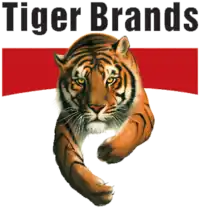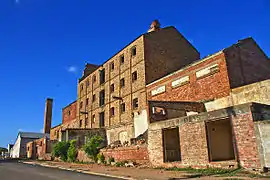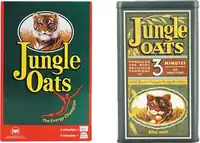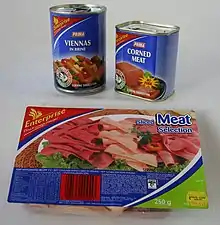Tiger Brands
Tiger Brands Limited (JSE: TBS) is a South African packaged goods company.[3] In addition to the company's South African operations, Tiger Brands has direct and indirect interests in international food businesses in Chile, Zimbabwe, Mozambique, Nigeria, Kenya, Lesotho and Cameroon.[4] Tiger Brands is South Africa's largest food company.[5]
 | |
| Type | Public company |
|---|---|
| JSE: TBS | |
| Industry | Consumer Goods |
| Predecessor | Tiger Oats |
| Headquarters | , |
Area served | South Africa and Selected Emerging Markets |
Key people | Khotso Mokhele (Chair) Noel Doyle CEO Pamela Padayachee CFO |
| Products | Over one hundred covering a variety of packaged goods and foodstuffs. |
| Revenue | |
| Total assets | |
| Total equity | |
Number of employees | 20 591 |
| Subsidiaries | 41 |
| Website | tigerbrands |
History


Jacob Frankel with help from Joffe Marks founded Tiger Oats Limited in 1921. Tiger Brands Limited was formerly known as Tiger Oats Limited and began as a family business.

Originally known as Tiger Oats, Tiger Brand's first product was a breakfast oatmeal brand called Jungle Oats. Jungle Oats are still produced by the brand. It was first conceived by Frankel towards the end of the 19th century and was finally launched in 1925. Tiger Oat's first mill was opened in Moorreesburg, Western Cape. A second mill was opened in Maitland, Cape Town when demand outgrew the Moorreesburg mill's capacity in 1930. The Moorreesburg mill was abandoned in about 1987.[6] In March 1982 Barlow bought a considerable share of Tiger Oats.[7]
In 1988 SPAR South Africa became a wholly owned subsidiary of Tiger Oats, however it was unbundled and listed as a separate company in 2004.[8] During the late 1990s Tiger Oats went through a period of rapid expansion. It bought out other large companies and competitors such as Imperial Cold Storage and Supply Company , a food packaging company (in October 1998)[7] and pharmaceutical company Adcock Ingram for R3.4bn in 1999.[9] After the buyouts Tiger Oats was renamed Tiger Brands. In July 2008 Adcock Ingram was unbundled from Tiger Brands.
Tiger Brands Limited's subcompany, Tiger Food Brands Ltd merged with Bromor Foods (Pty) Ltd, which owns the Super Juice carbonated drink.[10] On 1 October 2009, the company acquired Crosse & Blackwell's mayonnaise business for an undisclosed amount.[11][12]
In 2008 Tiger Brands launched an aggressive expansion program into the rest of Africa. In the process the company bought a controlling stake in a number of food processing businesses in Nigeria, Kenya, Ethiopia, and Cameroon.[13]
This included a R1.5 billion purchase of 65.7% in Dangote Flour Mills in October 2012, Nigeria's second largest milling operation. This and other investments in Africa proved to be costly and unproductive. Over capacity in the Nigerian market led to an operating loss of R2.7 billion by the time Tiger sold back the operation to Dangote for a token one US dollar three years later in 2015. Management issues in Tiger's Kenya operations and the collapse of its Mozambican distributor and Deli Foods subsidiary also negatively impacted the company in this period. This led to then CEO Peter Matlare to resign in November 2015 and a reorganisation of its non-South African operations.[13]
Current leadership
Noel Doyle was appointed chief executive officer with effect from 1 February 2020. Pamela Padayachee was appointed acting Chief Financial Officer with effect from 1 February 2020.
Scandals
Listeriosis outbreak
Tiger Brands was implicated in the world's largest listeriosis outbreak in March 2017 when polony produced at a factory in Polokwane‚ Limpopo by its subsidiary company, Enterprise Foods, was found to be the source of the outbreak by the South African National Institute for Communicable Diseases and announced by the Minister of Health.[14] The outbreak caused the deaths of 164 people and infected a further 872 people by 24 February 2018.[15] By 5 March 2018 a total of 180 people were thought to have died from the outbreak.[14] Tiger Brands stated that they had been presented with no evidence of their facility being the cause of the outbreak.[16] Following the announcement by the Minister of Health the company's stock price dropped by 7% resulting in R5.7bn (US$438.69 million) reduction in market capitalisation.[15]
Bread
In mid-November 2007 Tiger Brands was fined R98.8 million (roughly equivalent to US$12.8 million at the immediate spot exchange rate at the time)[17] by the South African Competition Commission for colluding with other bread producers to raise the price of bread by between 30c and 35c per loaf.[18]
According to the commission the four companies involved (Premier Foods, Tiger Brands, Foodcorp and Pioneer Foods) controlled more than 90 percent of the wheat flour market at the time. Facilitating their pricing activities through secret meetings and telephone calls between employees of these firms at various venues, including churches, stadiums and hotels. The commission also found that the price-fixing activities had a negative effect on both consumers as a whole as well as inhibiting smaller bakeries from being effective competitors.[19]
The fine reflected 5.7% of Tiger Brand's bread sales, coming mostly from its Albany brand, for the 2006 financial year.[18] Tiger Brands took full responsibility and then CEO Nick Dennis resigned.[20]
Adcock Ingram Critical Care
In May 2008 Tiger Brands agreed to pay a R53.5 million fine for alleged anti-competitive practices in its health care subsidiary Adcock Ingram Critical Care (AICC). AICC executive Arthur Barnett was suspended until the investigation was concluded.[21][22] In July 2008 Tiger Brands stated that it was going to unbundle its entire Adcock Ingram subsidiary with each Tiger Brands shareholder receiving one share in Adcock Ingram for every Tiger Brands share they owned.[23]
Subsidiaries
Over the years Tiger brands has acquired various subsidiary organisations:
| · Designer Group |
| · Durban Confectionery Works Proprietary Limited |
| · Enterprise Foods Proprietary Limited |
| · Langeberg Holdings Limited |
| · Langeberg & Ashton Foods Proprietary Limited |
| · Tiger Food Brands Intellectual Property Holding Company Proprietary Limited |
| · Tiger Consumer Brands Limited |
| · Tiger Brands (Mauritius) Limited |
| · Haco Industries Kenya Limited |
| · Chocolaterie Confiserie Camerounaise |
| · Deli Foods Nigeria Limited |
| · East Africa Tiger Brands Industries |
| · Davita Trading Proprietary Limited |
| · Pharma I Investment Holdings Limited |
| · Tiger Branded Consumer Goods plc |
| · Other miscellaneous, property, investment and dormant companies |
Brands
Brand (country if not in South Africa, year of acquisition and/or launch)[24][25]
- Purity baby food
- Elizabeth Anne's & Purity baby food
- Natural Good Nights baby sleep and scent oils
- Sun Smart Baby Range sunscreen
- Elizabeth Anne's & Purity Special Baby Shampoo
- Elizabeth Anne's & Purity Baby Aqueous Cream
- Elizabeth Anne's & Purity Baby Aqueous Lotion
- Elizabeth Anne's & Purity Baby Perfumed Jelly
- Elizabeth Anne's & Purity Baby Barrier Cream
- Elizabeth Anne's & Purity Baby Cornstarch Powder
- Elizabeth Anne's & Purity Baby Oil
- Elizabeth Anne's & Purity Baby Powder
- Vi-Daylin
- Telament
- Phipps Milk of Magnesia
- Muthi Wenyoni
- Antipeol
- All Gold
- Black Cat (1926)
- Colman's mustard
- Fatti and Moni's spaghetti (1982)
- Ice Cap
- Benny Stock
- Koo canned foods (1940)
- Spray & Cook cooking oil
- Mrs H.S.Ball's Chutney
- Energade energy drink (1993)
- Halls fruit juice (1999)
- Oros flavoured drink mix
- Jolly Jus
- King Korn, sorghum beer mix
- Kings Brew, sorghum beer mix
- Davita
- Maltex, hot wheat cereal
- Mnanti, sorghum beer
- Ambrosoli (Chile, 2001)
- Anytime (1990)
- Beacon Allsorts
- Beacon Slabs
- Beacon Fizz Pops
- Beacon Smoothies
- Beacon Sprikles
- Fizz Pop Magic Planet
- Fruit Chews
- Inside Story chocolate bar
- Maynards
- Superfine Chocolate
- Nosh Bar
- Now Bar
- Nut Puffs
- Tinkies
- TV Bar
- Wonder Bar
- Albany bread (established after numerous mergers and acquisitions in the 1970s and 1980s)
- Ace maize meal
- Golden Cloud flour
- Induna maize meal
- Jungle Oat Bran
- Jungle Oats
- Jungle Oats Energy Bar
- Jungle Lion Superpop, popcorn
- Maxi Meal
- Morvite cake mix
- Oats Easy Instant Oats
- Old Mill Stream Rice
- Olde Cape Seed Loaf
- Tastic Rice
- Tasmati
- Tastic Rice-O-Mix
- Tastic Savory Classics
- Taystee Wheat
- TNT Microwave Popcorn
- TNT Superpop
- Jerky Treats

- Renown
- Like it Lean
- Enterprise Foods
- Easy Meal
- Mrs. Paul's Kitchen
- Nice and Easy
- Simply Delicious
- Suddenly Supper
- Lucky Star canned fish
- Sea Harvest
- SA Sea Product Ltd
- Oceana
- Design Group shampoo and personal care products (1998)
- Cepacaine, mouth wash
- Gill
- Trinity Biotech
- V-Med
See also
References
- "INTEGRATED ANNUAL REPORT 2018". Tiger Brands. Retrieved 7 August 2019.
- "Tiger Brands Annual 2018" (PDF). Tiger Brands. 30 September 2018. Retrieved 7 August 2018.
- "These are the biggest consumer goods companies in Africa". Retrieved 10 April 2022.
- "JNB:TBS – Google Finance Search". google.com. Retrieved 31 August 2017.
- BHP, Blue Financial, Remgro, Telkom, Tiger: South African Equity Preview, By Janice Kew, Bloomberg, 21 June 2010.
- Jungle Oats brand history, retrieved 6 July 2010
- Brooke Simons, Phillida (2000). Ice Cold in Africa: The History of Imperial Cold Storage & Supply Company Limited. Cape Town: Fernwood Press. pp. 237–246. ISBN 1-874950-50-4.
- Trade Intelligence – SPAR, accessed 2 October 2010
- Business Day: Tiger Oats Bids For All, 7 October 1999
- Competition Tribunal of South Africa article on the merger and details. (PDF file) http://www.comptrib.co.za/%5Ccomptrib%5Ccomptribdocs%5C488%5C33LMApr06.pdf
- Thomson Reuters Business Description: Tiger Brands, retrieved 21 July 2010
- Business Day: Tiger Brands buys Crosse & Blackwell from Nestlé, Published: 2009/05/25
- Thomas, Stafford (15 July 2016). "Tiger Brands sharpening its claws". Financial Mail. Retrieved 26 July 2016.
- "Enterprise polony identified as source of listeria outbreak". Retrieved 5 March 2018.
- "Tiger Brands, RCL Foods lost R5.7 billion in one day after #ListeriosisOutbreak | IOL Business Report". Retrieved 5 March 2018.
- White, Ray. "No evidence yet of link between listeriosis deaths, Tiger Brands products". Retrieved 5 March 2018.
- "Trusted Global Currency Exchange & Money Transfer Solutions". www.xe.com. XE.com. Archived from the original on 16 May 2023. Retrieved 16 May 2023.
- MoneyWeb: "Tiger Brands admits to bread price-fixing, pays fine", 13 November 2007
- MoneyWeb: "Watchdog refers wheat milling cartel to Tribunal", 15 March 2010
- Business Report: "Tiger Brands Limited. Price-fixing saga bites Tiger Brands chief", 7 December 2007
- Adcock Ingram Critical Care (Proprietary) Limited ("AICC") Archived 16 September 2010 at the Wayback Machine, Tiger Brands website, 9 May 2008, retrieved 2 February 2011
- MoneyWeb: "Tiger Brands' Adcock Ingram to pay R53,5m for price fixing", 9 May 2008
- "Finance24: Tiger to unbundle Adcock Ingram", 21 July 2008
- "Profiles's Stock Exchange Handbook: October 2010 – January 2011". Profile's Stock Exchange Handbook. Johannesburg, South Africa: Sasfin: 357. 2010. ISSN 1680-0036.
- Mbendi – Tiger Brands Ltd (TIGBRANDS), accessed 2 October 2010